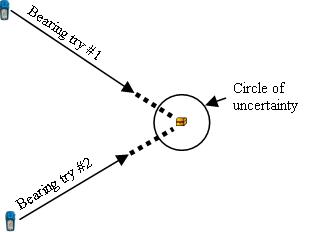Let's Go Caching
I can tell - you are really ready to go out and find that first cache. The next few observations will make that, and the others to follow, an exciting experience. Some are just common sense and others I have learned from experience. Read them and then develop your own style - it's your game!
First, let me share with you how His Princess and I got started in Geocaching and some of our likes and dislikes about the sport.
Christmas 2005, Marty, my son, of the Minnesota Cukes, gave me a Garmin eTrex Legend GPS and suggested that the game of Geocaching would be fun. Little did he (or I) know how true that statement would prove. On January 22, 2006, Cindy and I found our first cache (Huorm - GCR86M) . As experience and time would show, this was the perfect cache to shape our future geocaching style.
Huorm was a well designed, clean, ample sized, cleverly hidden cache in a great rural setting. Cindy and I both said “This is the game for us!!!” Since then, as this is being written, we have just passed our 500th find and realize what a great first find it was.
We made a promise to ourselves that we would gain some experience before placing our first cache. And then, at least for a while, we would not place more then 1 cache for every 10 found. We realized that for us, a good balance must be kept between finding and placing caches. We also, after finding 500 caches, made another promise to ourselves, that our caches would be “High Quality” (whatever that means) and we would try not to duplicate our style or type cache often. So far we have placed 13 caches, we feel, that have met that promise.
When we are caching, we find some very interesting great caches and many more that are good solid hides. There are a few dislikes that I feel I must share. One of my pet dislikes is hiking a mile or more through rough terrain and bushwacking the last 100 feet through Saw Palmettos only to find a micro or even a nano. Have a heart people, with the whole woods to hide a cache, make it a interesting one with good trade items. Next in line is those caches place in containers that are not waterproof and/or have very poor seals. It is very discouraging to find a cache half filled with water and everything covered with black mold. Third and final dislike is poor posted coordinates. I realize that deep in the woods and under heavy shade, it is hard to obtain good GPS signals. What I am talking about is out in the open and the cache is 200-300 feet from posted coords. Later on, I will share my method of obtaining great coords. Enough of the negatives - from now on, all positive.
Finding the Cache
You now have your computer and GPS unit. You have downloaded one or more LOC or GPX files from geocaching.com and have loaded them into your GPS unit. Or you have copied the cache coords from the website. FINE! Lets go caching.
From the website or your GPS unit, you know the general area of the desired cache. Let's assume that you are now within 500 feet of the cache and are walking. There are some basic insights to share that will make the find easier. Number one, realize that, according to the number and position of the satellites your GPS is locked into, the circle of uncertainty will be anywhere from a radius of 12 to 50 feet with about 18 feet most likely. That means the arrow on your navigation mode will become less and less accurate as you get near and enter the uncertainty zone. HINT: Take distance and directions from at least 30 feet from suspected cache. Better yet, do this and come in from a different direction to get crossing reference points (see drawing).

The more bearing tries you make from 50 feet or more distance away from the cache, the more likely you will "nail" the center of the likely location.
HINT: When you are in a deep woods situation, where satellite reception is poor, this method is really necessary.
As you get near the suspected location, keep your eyes
open to ALL possibilities. Experienced geocachers are very
sneaky in their hides.
Experience is the best teacher. Do not be discouraged the first few DNF's (Did Not Find) you log. All of us have our good days and we have our bad days. The fun is finally finding that cache that really has been bugging you. You have gone back maybe several times because the logs show everybody else has been finding it except you. Take my word - I have had my share of such. If you could easily find caches every time you tried - what would be the fun? It is supposed to be a challenge.
You have found the cache. Now What? Go to next page


